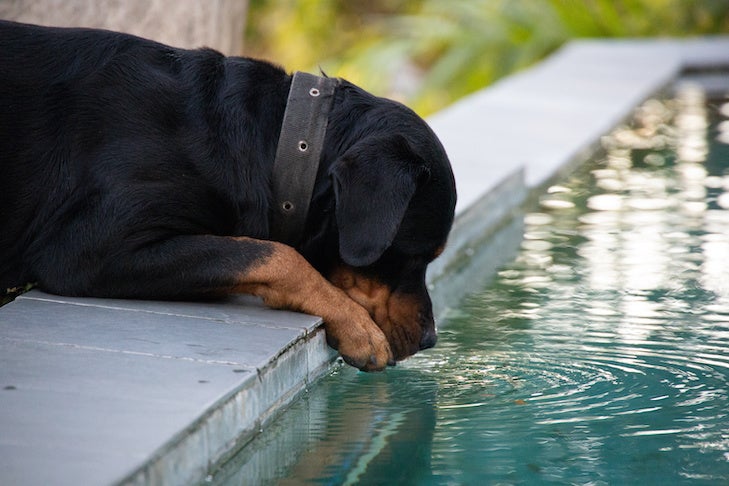
AKC is a participant in affiliate advertising programs designed to provide a means for sites to earn advertising fees by advertising and linking to akc.org. If you purchase a product through this article, we may receive a portion of the sale.
On warm days spent outdoors, it’s not uncommon to catch your dog lapping up a bit of pool water. But is it safe for dogs to drink pool water? Here’s what to know if you find your pup consuming chlorine.
Is Pool Water Safe for Dogs to Drink?
If your dog drinks a small amount of pool water, don’t panic. Chances are your pup will be perfectly fine, especially if your pool’s chlorine levels are at a safe balance. Most swimming pools have a low chlorine level and therefore the water in them won’t usually be harmful to dogs in small amounts.
That said, anything in excess can be a problem. If your dog drinks too much chlorinated water, this can cause irritation, which may lead to vomiting and esophagus erosion.

You may think the less chlorine, the better, right? Think again. Pool water can be dangerous if the chlorine levels are too high or too low. Untreated pool water can contain algae, parasites, and other bacteria. If you find you need to do a chemical shock to rebalance the pool, make sure to keep your dog away until the balance is safe.
One alternative to chlorine is bromine, which is more expensive but safer overall for pets.
The biggest toxic concerns are with chlorine tablets themselves. Make sure to store these in a safe place where your dog cannot access them.
How to Stop Dogs Drinking Pool Water
If you find your dog drinking swimming pool water frequently, here are steps to take.
- Make sure your dog has easy access to fresh water in a nearby bowl. If your dog seems disinterested in their water bowl, you might try an affordable pet drinking fountain that rotates water.
- Monitor for signs of overheating, dehydration, and heatstroke. If you’re out swimming, chances are it’s pretty warm outside.
- If your pet continues to lap up pool water, take them inside for a break.
- Use basic obedience training to redirect your dog, excite them with a new toy, or call them to their place (away from the pool).
Symptoms of Water Intoxication in Dogs
What if my dog drinks too much water? Although rare, water intoxication in dogs can happen when a dog drinks too much too quickly, no matter the source of the water.

Symptoms of water intoxication include:
- Vomiting
- Lethargy
- Bloating
- Loss of coordination (including stumbling, falling, or staggering)
- Restlessness
- Drooling
- Pale gums
- Dilated pupils
- Glazed eyes
If your dog is showing any of these signs, call your veterinarian and take your dog in as soon as possible.
What About the Beach?
If your dog swallows a few mouthfuls of salt water while playing at the beach, they may suffer diarrhea. More than that, and it could be fatal. Drinking too much salt water could lead to saltwater poisoning (also known as saltwater toxicosis). The best thing you can do is to make sure your dog has access to fresh water and is consuming plenty of it. Symptoms of saltwater poisoning include diarrhea, vomiting, weakness, and seizures. If you notice any odd behaviors after a day at the beach, call your vet immediately.

Lakes and ponds also present dangers. Blue-green algae poisoning has been known to kill dogs who simply go for a swim and swallow water while playing. This bacteria is found in non-flowing fresh water during hot seasons. Blue-green algae can also grow in backyard ponds or swimming pools if they aren’t taken care of.
The bottom line is that you should not let your dogs drink directly from swimming pools, beaches, ponds, or lakes. If you suspect your dog has had a drink from toxic water, rinse them off, give them plenty of fresh water, call your vet, and monitor them for any changes.
This article is intended solely as general guidance, and does not constitute health or other professional advice. Individual situations and applicable laws vary by jurisdiction, and you are encouraged to obtain appropriate advice from qualified professionals in the applicable jurisdictions. We make no representations or warranties concerning any course of action taken by any person following or otherwise using the information offered or provided in this article, including any such information associated with and provided in connection with third-party products, and we will not be liable for any direct, indirect, consequential, special, exemplary or other damages that may result, including but not limited to economic loss, injury, illness or death.

